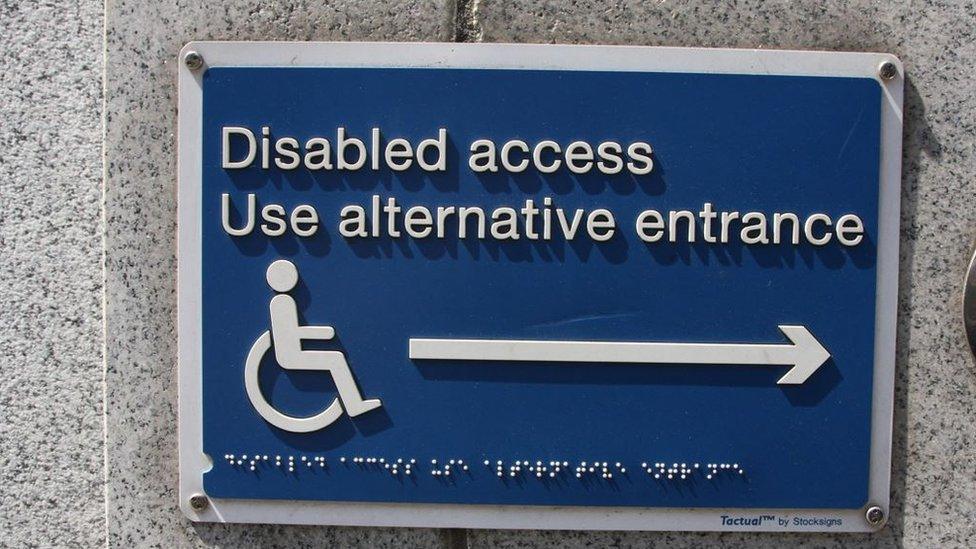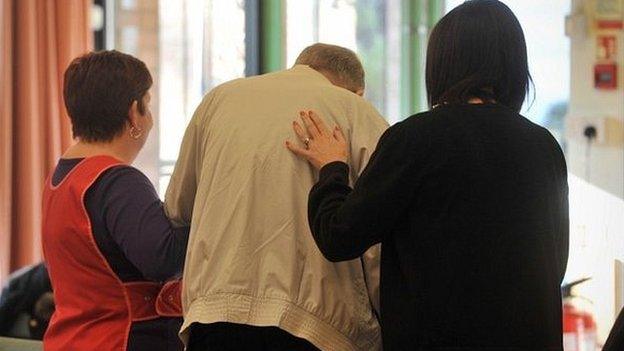NI employment rate for disabled people is lowest in UK
- Published

Just over a third of disabled people in Northern Ireland are in work
Northern Ireland has the lowest rate of employment for people with disabilities in the UK, according to new research.
Just over a third of disabled people in Northern Ireland are in work, compared with over half in the rest of the UK.
Those are key findings from a report from Ulster University's Economic Policy Centre (UUEPC).
The report said that progress on helping more disabled people into work had been "glacially slow despite numerous government interventions".
It also found one in three young disabled people aged from 16 to 24 was not in education, employment or training (NEET).
"A young disabled person is almost five times more likely to be NEET than a non-disabled person," the report said.
Disabled people in work were also likely to earn less and be in less secure employment.
"Failure to address the barriers to work that disabled people face is a failure to recognise the contribution that disabled people make and represents a huge opportunity cost to Northern Ireland's economy and society," the report concluded.
Disability employment gap
The UUEPC research looks at the how employment prospects for disabled people in Northern Ireland compare to those in the rest of the UK and to non-disabled people.
By almost all metrics their prospects are worse.
That also means that disabled people in Northern Ireland are at increased risk of living in poverty.
"Almost two-fifths (38%) of people living in households experiencing poverty in Northern Ireland include a person living with a disability," according to the UUEPC report.
Almost a quarter of a million (243,000) working-age adults in Northern Ireland are disabled - just over one-fifth of the working-age population.
Depression, anxiety or musculoskeletal conditions, which affect joints, bones and muscles, are the most common conditions suffered by people with disabilities in Northern Ireland.
The UUEPC report found that only 36% of disabled people in Northern Ireland were in work.
Four-fifths (80%) of people without a disability in Northern Ireland are in work.
That means there is a "disability employment gap" in Northern Ireland of 44% - the highest in the UK by a significant margin.

'Please give us a chance'

Jenny Dolan says the application process is discouraging and frustrating
Jenny Dolan was diagnosed with tuberous sclerosis as a one-year-old baby.
The rare genetic condition causes benign tumours to grow on different parts of the body and can cause a range of health problems.
"It's been quite difficult growing up in a place like Northern Ireland where there's a lot of restriction around disability," she told the BBC's Good Morning Ulster programme.
She left school 10 years ago and spent the first two years training for the catering industry in a facility called Dr B's Kitchen, which has since lost its funding and closed.
Ms Dolan then got a full-time job in a restaurant in west Belfast where she worked for eight years.
"It was brilliant. The employer was very supportive, very helpful and I had a key worker that helped as well," she said.
However, she added that disabled people still face lots of barriers when applying for jobs, including the very drawn out process of having to declare a significant disability which she finds "very discouraging and frustrating".
"What I would say to future employers and anybody that's looking at a potential person with a disability to employ them - please give us a chance - because everybody out there that applies for a job wants to be there and wants to have a job and wants to make a contribution to your business.
"So please give us a chance and you won't regret it."
'You have to look further than autism'
Claire Burke has a law degree from Queen's University Belfast but is currently out of work.
She was diagnosed with autism 15 years ago and often struggles with the job application and interview process.
"I would also say to employers - you have to look further than the autism. You have to look beyond it because neuro-typical people have a certain way of acting and doing things, autistic people have a totally different way of acting and doing things," she said.
"We're very meticulous; we're very good at problem-solving; we're very loyal employees and we tend to stick to the one [employer] because it's good routine for us. So we're not just going to up and leave after a few months.
"I think if employers could see what qualities and advantages autistic people bring to the workplace they would actually welcome and encourage autistic people applying to their company."

Four-fifths (80%) of people without a disability in Northern Ireland are in work.
That means there is a "disability employment gap" in Northern Ireland of 44% - the highest in the UK by a significant margin.
The disability employment gap is the difference between employment rates for people with disabilities and people without disabilities.
"Failures to achieve better employment outcomes for disabled people in the Northern Ireland labour market relative to the UK contribute to a range of personal and societal issues," the report said.
Those include "increased risk of poverty, financial difficulty, loss of human capital, social exclusion and a much higher dependence on income replacement benefits related to illness and disability."

The pandemic and restrictions also affected the opportunities for young disabled people aged from 16 to 24 to find work
The UUEPC report also concluded that the pandemic and restrictions also had a "disproportionate" impact on disabled people.
"A higher likelihood of working in sectors shut down by the pandemic and a higher likelihood of being classed 'clinically vulnerable' meant higher proportions of disabled were furloughed," it said.
The pandemic and restrictions also affected the opportunities for young disabled people aged from 16 to 24 to find work.
Previous research by Ulster University suggested that wider support services for people with learning disabilities "disappeared or were markedly reduced" during the pandemic.
'Key component of employment'
The UUEPC report's authors conclude that Northern Ireland should try to match the UK's disability employment rate over the next decade.
This would mean that over half of disabled people in Northern Ireland would be in work by 2031.
The authors said meeting that target would lead to fewer disabled people in poverty, would add an additional £1.3bn to the Northern Ireland economy and lead to savings of £400m from the public purse.
- Published26 May 2021

- Published22 November 2021

- Published3 December 2021

- Published8 July 2020
